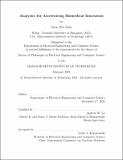Analytics for accelerating biomedical innovation
Author(s)
Siah, Kien Wei.
Download1252062168-MIT.pdf (6.655Mb)
Other Contributors
Massachusetts Institute of Technology. Department of Electrical Engineering and Computer Science.
Advisor
Andrew W. Lo.
Terms of use
Metadata
Show full item recordAbstract
Despite the many breakthroughs in biomedical research and the increasing demand for new drugs to treat unmet medical needs, the productivity of research and development in the pharmaceutical industry has been steadily declining for the past two decades and is at its lowest level today. Traditional sources of financing in biopharma are no longer compatible nor aligned with the new realities of biomedical innovation, a process which has become more challenging, complex, expensive, time-consuming, and risky in the past twenty years. This has led to an outflow of capital from the biopharma industry, creating an ever-widening gap in funding between early-stage basic biomedical research and late-stage clinical development, where many promising academic discoveries fail not because of bad science but due to financial reasons. In this thesis, we explore the use of data analytics to facilitate biomedical innovation with a particular emphasis on the mismatch between the risk characteristics of biomedical projects and the risk preferences of biopharma investors. We begin with a brief introduction of the challenges faced by the biopharma industry in Part I. In Part II, we focus on analytics in the context of clinical trials. First, we develop analytics for precision medicine in non-small cell lung cancer, an emerging area of innovation in disease treatment with the advent of human genome sequencing. Next, we train and validate predictive models for estimating the probability of success of drug development programs. By providing greater risk transparency, our models can help facilitate more accurate matching of investor risk preferences with the risks of biomedical investment opportunities, thus increasing the efficiency of capital allocation. Finally, we turn our attention to the ongoing COVID-19 (coronavirus disease 2019) pandemic. We propose a systematic framework for quantitatively assessing the potential costs and benefits of different vaccine efficacy trial designs for COVID-19 vaccine development, including traditional and adaptive randomized clinical trials, and human challenge trials (HCTs). Our results contribute to the current ethical debate about HCTs by identifying situations where HCTs can provide greater social value versus non-challenge development pathways, and are thus justifiable. In Part III, we explore new business models to address the dearth of funding for translational medicine in the valley of death. In view of the increasingly critical role that academic institutions play in the biotechnology industry, we develop a systematic framework for tracking the financial and research impact of university technology licensing in the life sciences using the Massachusetts Institute of Technology as a case study. Next, we investigate the use of a recently proposed megafund structure for financing early-stage biomedical research. We extend the existing model to account for technical correlation between assets in the underlying portfolio, thus allowing us to evaluate the tail risks of the megafund more accurately. We show that financial engineering techniques can be used to structure the megafund into derivatives with risk-reward characteristics that are attractive to a broad range of investors. This allows the fund to tap into a substantially larger pool of capital than the traditional sources of biopharma funding. In the last part of the thesis, we further extend the megafund framework to include adaptive clinical trial designs, and demonstrate the economic viability of using the megafund vehicle to finance and accelerate drug development for glioblastoma, a disease with very few treatment options, low historical probabilities of success, and huge unmet need.
Description
Thesis: Ph. D., Massachusetts Institute of Technology, Department of Electrical Engineering and Computer Science, February, 2021 Cataloged from the official PDF of thesis. Includes bibliographical references (pages 347-367).
Date issued
2021Department
Massachusetts Institute of Technology. Department of Electrical Engineering and Computer SciencePublisher
Massachusetts Institute of Technology
Keywords
Electrical Engineering and Computer Science.